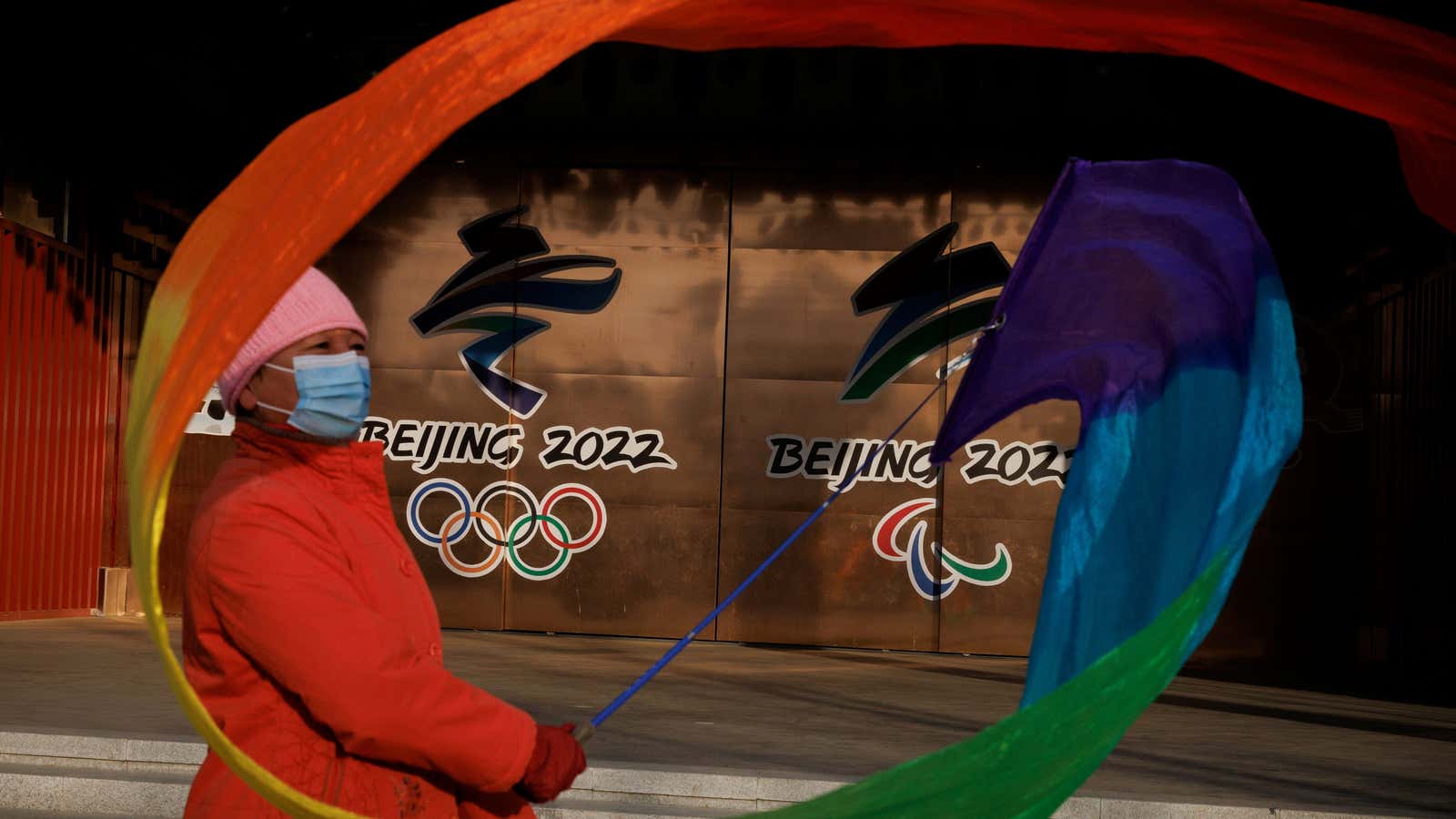The world is just eight weeks away from the start of the 2022 Beijing Olympics, but tensions around the host nation’s stance on human rights continue to mount.
This week, the US government announced a diplomatic boycott of the Olympics due to China’s “egregious human rights abuses and atrocities in Xinjiang.” Soon after, the UK, Australia, and Canada joined the diplomatic boycott, which will keep government officials away from the event, but allow athletes to compete in the games.
“The United States will pay a price for its mistaken acts,” Zhao Lijian, China’s foreign ministry spokesman, said in response to the boycott. But aside from diplomatic and cultural impacts, the biggest price to be paid related to the boycotts could be by the multinational companies sponsoring the winter games.
Why some are pushing for sponsors to pull out of the Beijing Olympics
US companies like Airbnb, which haven’t shied away from politics in the past, as well as corporate stalwarts like Coca-Cola, Intel, and Procter & Gamble, are now being thrust into a political spotlight while simultaneously attempting to maintain good relations with China.
China’s critics, which includes human rights organizations, view involvement in the upcoming Olympics as tacit support for some of the country’s human rights policies, including repression of Uyghurs in the Xinjiang region
“Sponsors must remember that they are already paying the price in the United States and other markets for supporting an Olympics happening in a country with an active genocide,” Isaac Stone Fish, the founder of Strategy Risks, a firm that advises corporate clients in China, told Quartz.
What the Olympic sponsors are saying, and not saying
Global sponsors like Swiss watchmaker Omega deny their sponsorship is an endorsement of China’s policies. “Omega’s role is to serve the world’s best athletes as they compete on the global stage,” the company said in a statement. “The brand has absolutely no influence on decisions made by individuals or states in regards to attendance.”
Olympics sponsor partner Atos, a France-based cloud and data management company, struck a similarly noncommittal stance. “Atos is proud of the role we play in delivering digital technology,” the company said in answer to a request for comment. “We enable the digital Olympic Games wherever they take place, notwithstanding other considerations. We do not comment on issues outside of our role as Worldwide IT Partner of the Olympic and Paralympic Games.”
Currently, there are 14 companies taking part in the Olympic Partner Programme, the highest tier of the International Olympic Committee’s (IOC) sponsorship which gives the brands multiyear rights to the Summer, Winter, Paralympic, and Youth Olympic Games. Some sponsors, like Panasonic and Visa, have been in the IOC’s program since the 1980s.
The games also offer Olympic Gold Partners, Olympic Official Partners, and Olympic Official Supporters sponsorship tiers (pdf) focused on domestic promotions.
Other partner companies did not respond to requests for comment.
The recent history of multinational brands in China points to a familiar outcome for the 2022 event
Corporate entanglements with China’s human rights issues are nothing new. Companies such as Zara and H&M have been forced to grapple with the potentially brand tarnishing consequences of doing business in China while attempting to appease the government and its strict monitoring of corporate statements critical, even tangentially, of the country’s policies. Nike and Adidas have also been hit with boycotts in China after taking critical positions on the country’s human rights issues.
Given this history of economic knock-on effects for companies that acknowledge China’s human rights issues, it’s no surprise that some corporate sponsors are, for now, avoiding directly addressing the new diplomatic boycotts.
“Governments can’t order companies to withdraw. Many of the companies have signed contracts until 2028, 2032, and to pull out of the games would lead to complicated legal, logistic, not to mention financial issues,” said Xuefei Ren, a China expert and associate professor of sociology at Michigan State University. “[Companies] such as Coca-Cola, are so embedded in the Chinese market it’s hard to imagine it will boycott the Olympics.”
However, as the Olympics approach, the current low hum of critical discourse will likely be elevated to a prolonged din of high-profile objections and public protests that will shadow the two-week event.
“Unfortunately for [Olympic sponsors], the era where a major multinational could flourish in China without increasing its regulatory and reputational risks in the United States is now over,” said Stone Fish. “Both Beijing and Washington want companies to increasingly choose whose laws, values, and customers they will serve. It’s a difficult but essential choice.”
